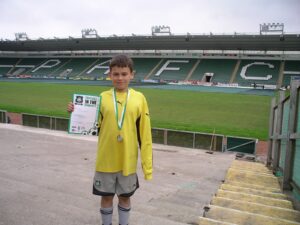Authors
In his blog, PPL Consultant, Matt Sandys, shares his experience of volunteering with the Argyle Community Trust. As part of PPL’s commitment to volunteering, Matt is supporting the Brickfields development project, which is set to become a new hub for the local community in Devonport & Stonehouse.
When I joined PPL, one of the aspects I was most excited about was having 10 volunteering days, with total agency over their usage. It signalled a real commitment to social impact and still surprises a lot of people when I tell them about it.
Combined with the little (or well, depending on who you ask) known fact that I’m a huge Plymouth Argyle fan (owing to family connections and childhood summers spent in The West Country), I knew I wanted to link the two.
I wasn’t quite sure how, but I’d had an idea since seeing the logo of Project 35 adorn the front of the first team’s matchday shirts. This was in support of The Argyle Community Trust (a separate organisation, though deeply linked with the football club itself), whose flagship food poverty campaign takes the name Project 35 from the damning statistic that 35% of children in some wards of the city were living in food poverty.

This wasn’t my first interaction with the Trust. That was actually during one of those childhood summers, when I attended a football in the community day, aimed to increase participation in sport.
Knowing I wanted to get involved, I reached out the Trust and after a few introductory conversations I was down in Plymouth, hi-vis on, shuttling crates of food around to help get their weekly food larder read. What soon became apparent was the size and impact of the Trust in the local community.
One of the areas where the Trust thought I could make a significant impact was by supporting them with community engagement around their new Brickfields development, drawing on work PPL has done previously around community engagement, and analysis of qualitative data.
Brickfields is a huge investment, backed by the club itself alongside the Trust, with the aim of providing an essential set of community assets to one of the poorest areas not just in the city, but the entire country (some wards ranking in highest 1% on Indices Multiple Deprivation).
The project is turning an under-utilised commercial gym into an anchor institution for the local community, with services ranging from a soft play area and café, through to a specialist veterans and mental health support hubs, all under a single roof. It really drives home Dwain Morgan’s, the Trust’s head of Business and Impact, point that “We aren’t just a group of people in tracksuits with the Plymouth badge stitched on the chest”.
So far, I’ve been working with the team to develop an engagement framework and strategy, to help ensure that it becomes an asset for the local community, and if it’s not, make sure there’s the right information to change that.
Volunteering with the ACT has also drilled home the huge potential of the football clubs and their associated community Trusts have to drive social impact.
They are uniquely placed as one of the few remaining organisations that by their very nature are embedded within their local community. In fact, through the physical presence of a stadium and the generation spanning network of relationships between fans, there is incredible potential to reach even the most underrepresented communities.
With the renewed focus on the role of place across the public sector, it is no wonder that some councils are commissioning services run by community Trusts’. The incredible work of these organisations is starting to be properly recognised, and their potential for social impact might just represent opportunity for football to escape the old cliché and truly be “more than just a game”.





